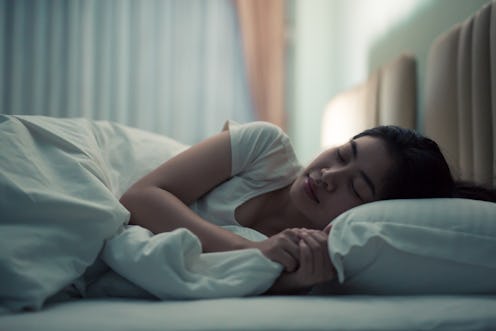Life
The One Problem With Clean Sleeping

You might recall a recent article that's been circling the web about "Clean Sleeping" from the Gwyneth Paltrow-helmed Goop, which claimed that we should strive for a minimum of 10 hours of sleep a night, unmarred by electronic devices and other mental distractions, among many other things. However, it seems the trouble with this trend is that not all therapists or doctors are behind it. In fact, some doctors believe that the problem with clean sleeping is that 10 hours a sleep a night could end up doing a lot more damage than improvement in your sleep life. Essentially, it could end up causing long-term sleep issues and encourage people to develop poor sleep habits.
I know it sounds insane, and my college mind is totally blown by this concept, but there is such thing as too much sleep. There's a sweet spot that we should all aim to hit (it's generally around eight hours) — if we sleep less than that amount, we tend to feel tired, and if we sleep more than that amount, we also tend to feel tired. No one ever complained about feeling too awake, but if you do over-sleep one night, you might have trouble getting yourself to sleep the next night. Essentially, if you don't sleep for just the right amount of time one night, your sleep the next night will be affected.
Of course, if you're actively sleep deprived though, the story is a little different — you might actually need those 10 hours for at least a night or two. But for everyone, else, that amount might be too much. As sleep expert and sleep consulting firm founder Dr. Els van der Helm, Ph. D tells Bustle, "The issue is, when you try to get so much sleep, what happens is that your sleep is going to get really fragmented. You're going to wake up multiple times in the night because your sleep pressure just isn't that high anymore."
She continues, "however, once you start to wake up a lot of times in the night, then you get the danger of actually developing insomnia [...] It's all coming from your push to get more hours of sleep where your body doesn't seem to need it. The optimal amount of sleep is where you can sleep pretty well throughout the night without spending a lot of time awake in bed."
So, according to Dr. Van der Helm, the concept of 10 hours is too extreme for the average person looking to improve their sleep quality, and there's a really small percentage of people that would actually need those 10 hours. Eight hours is more than enough for the average non-sleep deprived person.
As for other concepts associated with clean sleeping, there are a few that are worth considering. Though it's not revolutionary, the article suggests mediation before bed. Instead of just sliding into bed fresh out of work or a party, take some time to yourself to be quiet, still and unwind. Stretch a bit, get comfortable, and find some inner peace without your phone. And speaking of your phone, keep it away from you: Clean sleeping suggests removing your phone from you night time routine. You'll want to turn it on silent and plug in it, far away from you bed, ASAP.
In essence, the most important notion to take from the clean sleeping craze is that going to bed should be about sleeping again. Not just some bonus time to play on our phones or watch TV or talk to our friends. It's about getting into bed with one goal: falling asleep for the night. Not sleeping for more hours than necessary a night.